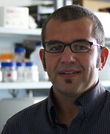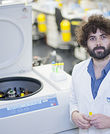
Dr Kate Jeffrey
Assistant Professor
Gastrointestinal Unit, Department of Medicine
Massachusetts General Hospital, Harvard Medical School
KJeffrey@mgh.harvard.edu
Research Activities
At the core of every immune response is a signal-, cell lineage-specific and kinetically precise gene expression program. It is becoming increasingly clear that the epigenome is critical for generating such precise transcriptional responses in diverse innate immune cell types. To this end, post-translational modifications on histones control the accessibility of DNA to transcription factors and serve as docking sites for epigenetic "reader" proteins that aid assembly of transcriptional machinery complexes. Dysregulation of many epigenome regulators is a recurrent and sentinel event in multiple diseases, including some immune disorders. Hence, proteins and that "write", "erase" or "read" the epigenome are some of the most promising and intently pursued targets in drug discovery today. BET inhibitors are an exciting and novel class of epigenetic therapy that disrupt binding of "reader" proteins Brd2, Brd3 and Brd4 to modified histones. Work during my postdoctoral studies was integral to the development of these novel agents as anti-inflammatory therapies. These drugs have now entered clinical trials as novel anti-cancer and anti-inflammatory drugs. Based on this promise, my laboratory at MGH is now exploring novel epigenome reader proteins that dictate innate immune cell function. We are also investigating the potential of other small molecules targeting epigenetic machinery as a way to boost or subdue the innate immune response in disease. Furthermore, we are understanding how pathogens have hijacked the immune cell epigenome for their benefit and the consequence of mutated epigenetic enzymes for immune driven disorders.Techniques/Expertise
Macrophages, pathogen recognition receptors, virus infectionEpigenetics, non-coding RNA
Chromatin Immunoprecipitation following by high-throughput RNA sequencing (ChIPseq)
High-throughput sequencing of RNA isolated by crosslinking immunoprecipitation (HITS-CLIP)
RNAseq, microarray
Signal Transduction
Lentivirus and Retrovirus transduction
Conditional gene targeting
Collaborations
Associate Professor Nina Papavasiliou, The Rockefeller UniversityKate Fitzgerald, UMass
Ramnik Xavier, The Broad Institute
Hans-Christian Reinecker, MGH, Harvard Medical School
Prof Paul Hertzog
Eicke Latz, Bonn University
Disease Models
Models of infection: Influenza, Listeria, Vesicular Stomatitis Virus, EMCVInflammatory models: K/BxN, LPS endotoxic shock, cegal ligation puncture, DSS colitis,



































